Key takeaways:
- Audits ensure accuracy in financial statements, build stakeholder trust, and aid in risk management.
- Effective audits foster team collaboration and clear communication, empowering staff to share insights.
- Learning from audit findings drives continuous improvement and enhances organizational processes.
- Documenting best practices and fostering open communication post-audit can significantly improve future audit experiences.
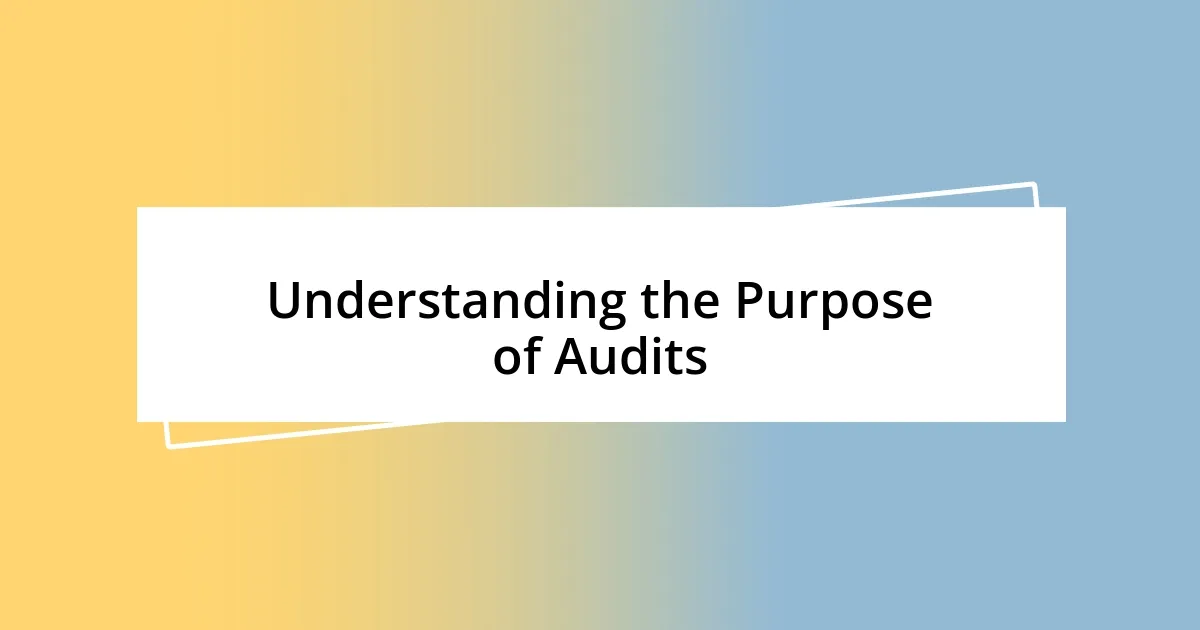
Understanding the Purpose of Audits
Audits serve a crucial purpose by ensuring that an organization’s financial statements are accurate and comply with relevant laws and regulations. I remember going through an audit process that felt daunting at first, but as I understood its purpose, I realized it acted as a safeguard. It highlights areas for improvement, leaving me pondering: how can we grow if we’re not holding ourselves accountable?
The essence of an audit is more than just checking boxes; it’s about building trust with stakeholders. Once, during an audit, I witnessed how transparency strengthened relationships with our clients. It made me think—aren’t we all striving to create an environment of trust in our professional dealings?
Moreover, audits play a significant role in risk management. In my experience, identifying potential risks during the audit process has often reshaped strategic decisions. Have you ever considered how proactive audits could be the key to avoiding major pitfalls down the line? It’s a thought worth exploring, as they truly empower organizations to navigate their future with confidence.
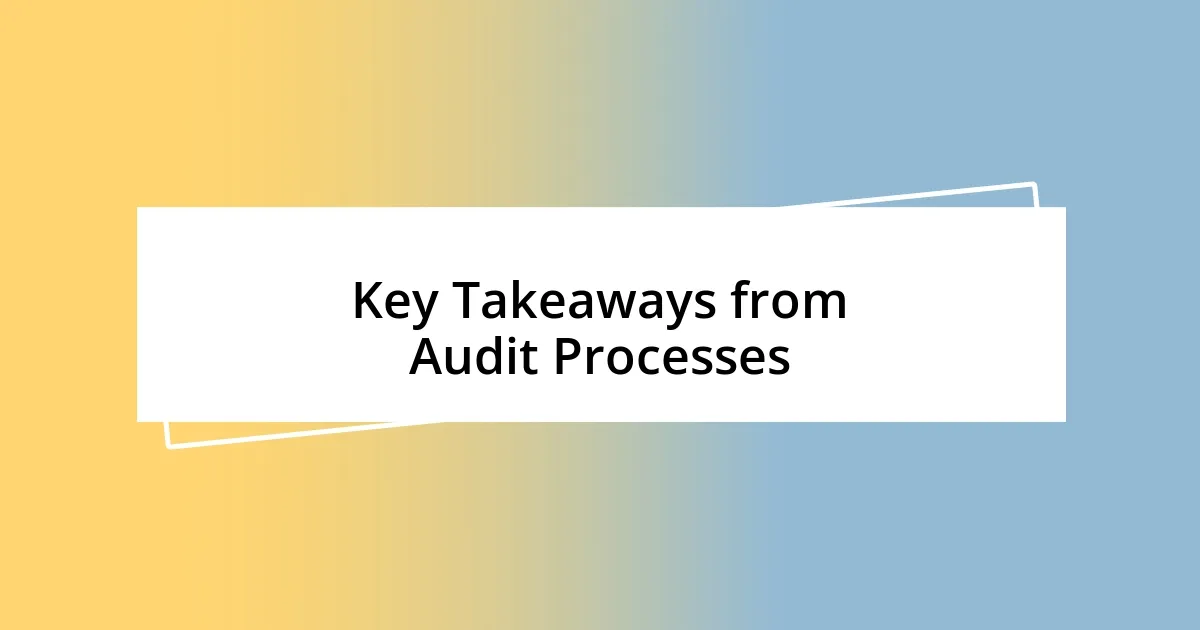
Key Takeaways from Audit Processes
Audit processes bring to light not just compliance issues, but also valuable insights that can lead to real improvements. One memorable experience I had involved uncovering inefficiencies in our reporting procedures. It was like a hidden treasure map; once we identified these areas, the team rallied together to streamline our processes. I often ask myself: how many other opportunities for progress are tucked away, waiting for an eager eye to find them?
Another significant takeaway from the audits I’ve participated in is the importance of team collaboration. I distinctly recall a time when our auditors emphasized the need for clear communication among departments. That experience taught me that successful audits are less about strict adherence to rules and more about fostering an environment where everyone feels accountable and empowered to share insights. After all, isn’t collaboration the glue that binds success in any venture?
Finally, I believe audits are essential for cultivating a culture of continuous improvement. During one audit, feedback from our auditors provided actionable insights that led to increased efficiency across the board. It was a powerful reminder that feedback, even when it feels uncomfortable, can be the catalyst for growth. Have you ever realized how a single audit can initiate a wave of positive change within an organization? It’s a testament to the enduring value of this process.
| Key Takeaways | Personal Insights |
|---|---|
| Identifying Inefficiencies | Uncovering opportunities led to tangible process improvements. |
| Team Collaboration | Clear communication among teams is vital for effective audits. |
| Continuous Improvement | Feedback from audits can spark transformative changes. |
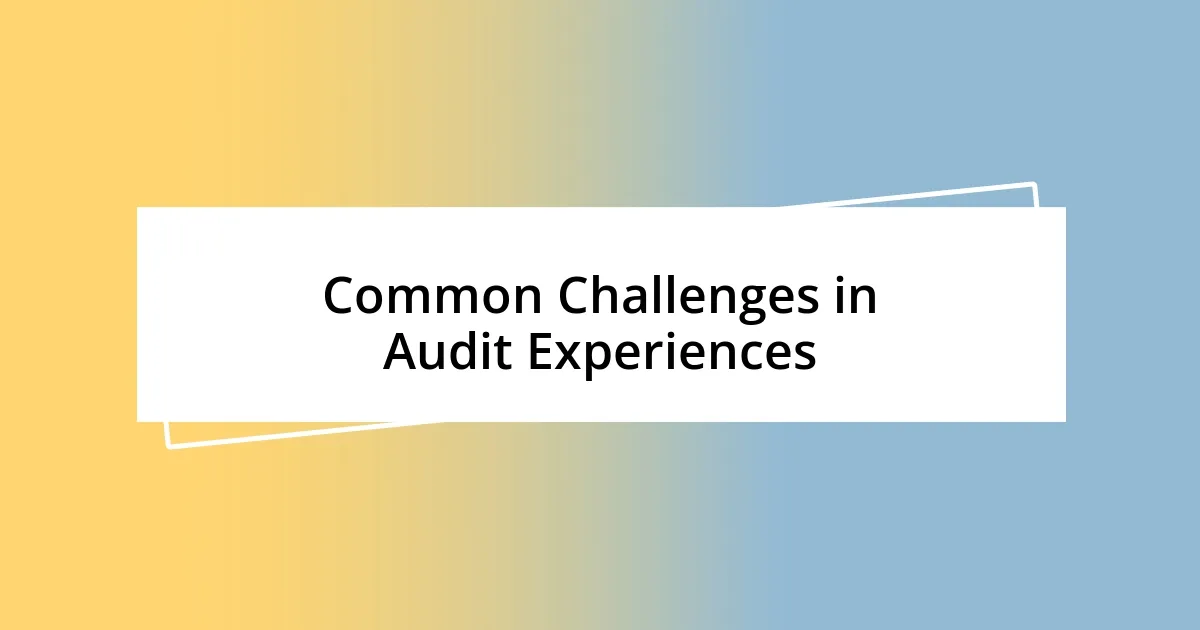
Common Challenges in Audit Experiences
Experiencing audits can often feel like navigating a complex labyrinth, filled with challenges that require both patience and adaptability. One particular instance stands out in my memory when we faced unexpected resistance from staff during an audit. The initial tension created a barrier, making it difficult to gather necessary information. It was a lesson in understanding that, at times, the biggest hurdle isn’t the numbers, but the people behind them. Creating an open dialogue laid the foundation for a smoother process, reminding me how crucial it is to address fears and misconceptions early on.
Here are some common challenges I’ve observed in audit experiences:
- Communication Gaps: Misunderstandings can arise when expectations are not clearly articulated.
- Resistance to Change: Staff members may feel uneasy or protective over their routines, making it hard to implement recommended changes.
- Time Constraints: The tight schedule of audits can lead to rushed reviews, resulting in overlooked details.
- Data Accessibility: Obtaining the right data can be a logistical challenge, particularly in larger organizations.
- Scope Creep: Sometimes, there’s a tendency for the audit focus to expand unexpectedly, complicating preparations.
These challenges have taught me that navigating the audit process is as much about managing people and their concerns as it is about crunching numbers. Each obstacle offers valuable lessons that, when addressed, can ultimately enhance both the audit experience and the organization’s growth trajectory.
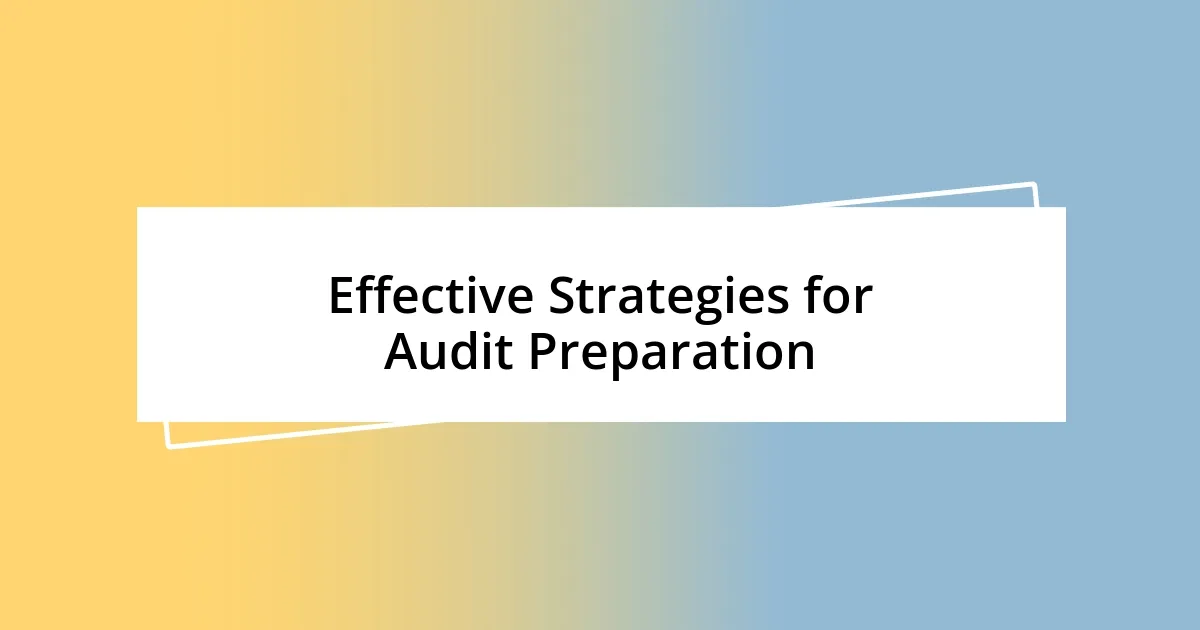
Effective Strategies for Audit Preparation
When it comes to audit preparation, I’ve found that setting clear goals is crucial. Before one audit, my team and I spent hours discussing what we hoped to achieve. I remember the feeling of clarity as we outlined specific objectives—it felt like crafting a roadmap that guided our efforts. Have you ever considered how clarity can transform a daunting task into an organized initiative?
Equally important is the role of documentation in audit prep. During a particularly challenging audit, I learned that organizing past reports and relevant documents ahead of time can save hours of scrambling later. I recall sifting through piles of papers and feeling overwhelmed, which made me realize that a structured filing system creates a smoother experience. How much time could you save by being proactive with your documentation?
Lastly, practicing mock audits can significantly enhance preparedness. When my team conducted a practice run prior to an actual audit, it revealed gaps we hadn’t previously noticed. That experience was eye-opening; it became clear that rehearsing the audit process helped us identify weak spots in our approach, ultimately leading to a more polished performance. Isn’t it fascinating how simulating the real thing can boost your confidence and video game-level performance?
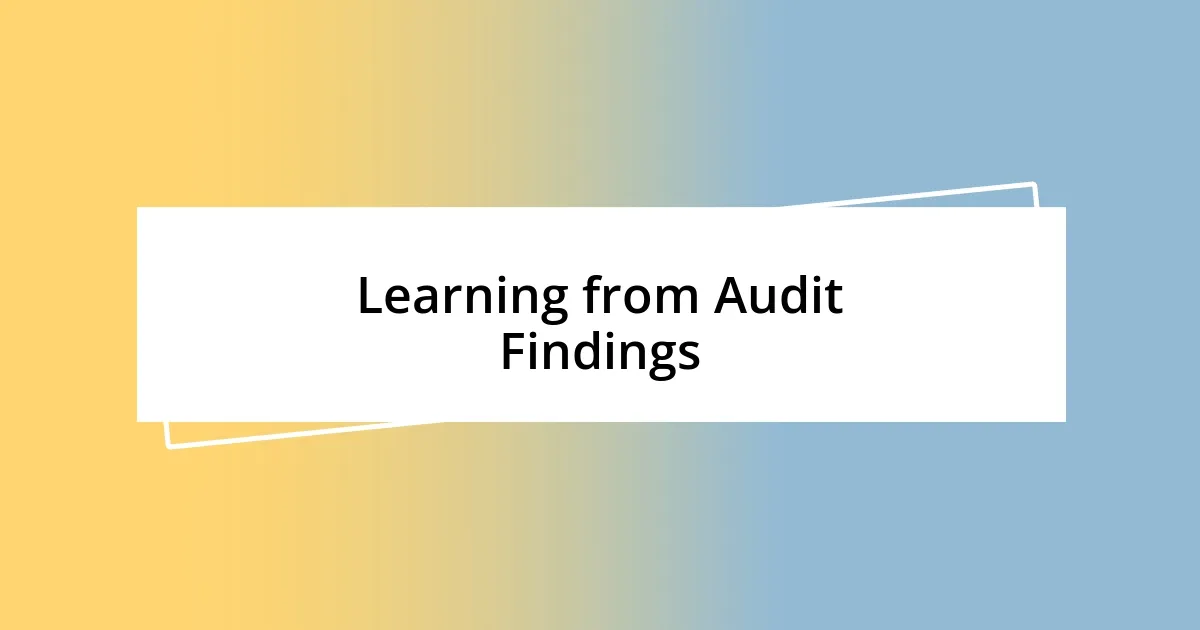
Learning from Audit Findings
Learning from audit findings can be an enlightening experience. I remember a particular audit where we received feedback about our financial reporting practices. Initially, I felt defensive; no one likes to hear that something they worked hard on needs improvement. However, as I delved deeper into the findings, I realized they offered a golden opportunity for growth and refinement. Instead of viewing the audit as criticism, I began to see it as a chance to elevate our processes. Isn’t it fascinating how a change in perspective can turn a setback into a stepping stone?
One lesson that resonated with me was the importance of implementing changes based on audit recommendations. After one audit, my team took the time to develop action plans addressing the areas identified for improvement. Reflecting on that process, I was surprised at how quickly small adjustments led to tangible benefits. Staff morale improved as everyone felt included in the journey toward enhancing our effectiveness. Have you ever noticed how empowering team members to take part in change can create a positive ripple effect throughout the organization?
Lastly, I discovered that sharing audit findings with the entire organization is invaluable. During a team meeting, when I presented our audit results, the room was filled with a mix of curiosity and apprehension. But that conversation sparked discussions on best practices and innovative solutions, transforming initial anxiety into collaboration. What if we all began to view audit findings not just as compliance checks, but as a springboard for collective improvement? Engaging everyone in this manner truly fosters a culture of continuous learning, which can be a game changer for any organization.
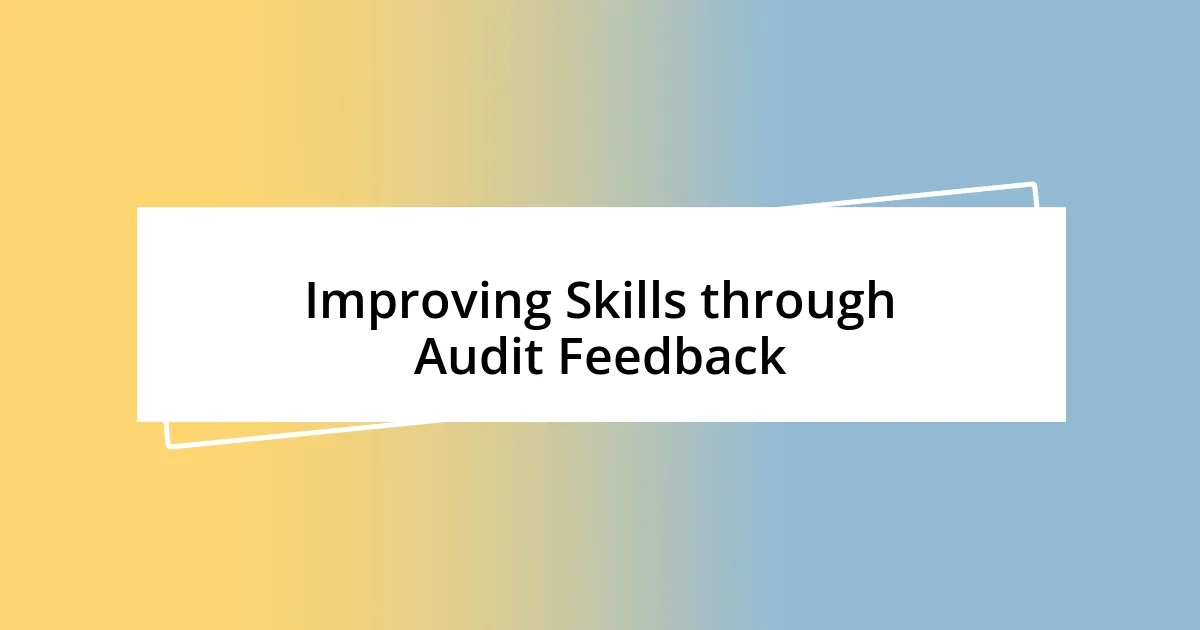
Improving Skills through Audit Feedback
Gaining feedback from audits has been a transformative experience for me, particularly when it comes to skill enhancement. After one specific audit, I received detailed feedback that highlighted my missteps in data analysis. At first, I felt a wave of disappointment wash over me, but soon I realized these insights were precisely what I needed to sharpen my skills. Isn’t it true that sometimes our biggest growth comes when we confront our weaknesses head-on?
I remember implementing a 360-degree feedback approach post-audit, where everyone, from top management to junior staff, shared their thoughts on areas to improve. It was initially daunting to hear differing opinions, but the dialogues that emerged were rich and eye-opening. I vividly recall how a junior staff member’s suggestion on streamlining reporting processes drastically improved our efficiency. How often do we overlook the valuable perspectives of those who might seem less experienced?
Another essential aspect of audit feedback is its role in fostering a culture of continuous learning. After undergoing a series of audits, I made it a point to create feedback loops within our team. Each audit became a learning opportunity where we discussed adjustments and strategies. This practice not only deepened our expertise but also nurtured stronger collaboration. Have you ever noticed how collective problem-solving can turn feedback into an inspiring catalyst for team growth?

Applying Lessons to Future Audits
One significant way I apply lessons from audits to future experiences is by adopting a proactive mindset. For instance, after learning about gaps in our internal controls during an audit, I initiated regular check-ins with my team to discuss potential risks before they became issues. This shift helped diminish the anxiety around audits and instead turned our discussions into valuable planning sessions. Isn’t it amazing how a simple adjustment in approach can transform how you view oversight?
Additionally, I’ve found that documenting best practices after each audit can be a game changer. I remember sitting with my team, compiling a “lessons learned” document following one particularly challenging audit. This artifact not only served as a reference for new team members but also became a rallying point for ongoing training sessions. How does creating such resources reap long-term benefits for our processes and team dynamics? I truly believe it lays the groundwork for a stronger, more resilient organization.
Moreover, fostering open communication about audit findings has proven invaluable. After one audit, I encouraged my team to share their thoughts candidly, and I was struck by the insights they provided. Suddenly, it wasn’t just about compliance; it was a collaborative effort to drive improvement. Have you ever noticed that when everyone feels free to speak up, it can uncover innovative solutions we may not have considered? Embracing this culture of dialogue not only enhances future audits but also enriches our team’s growth experience overall.














